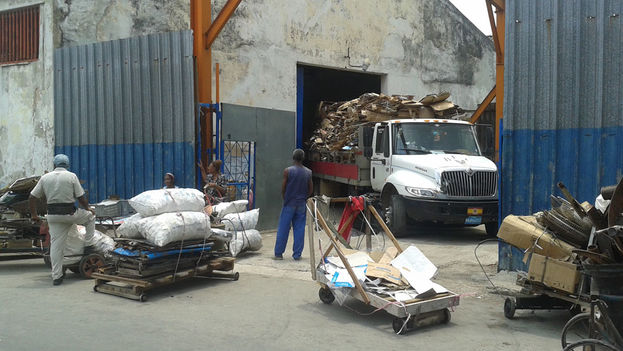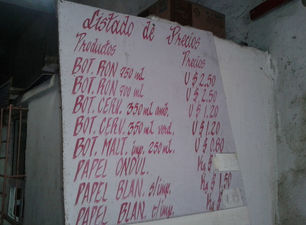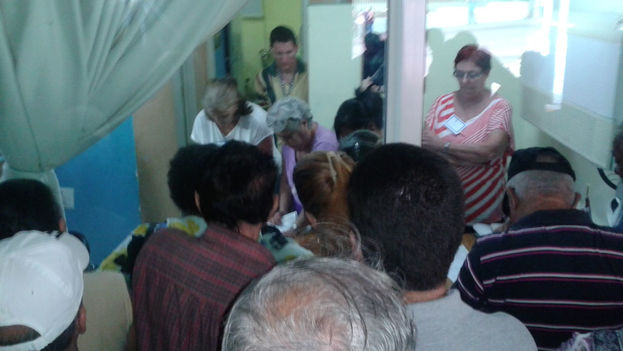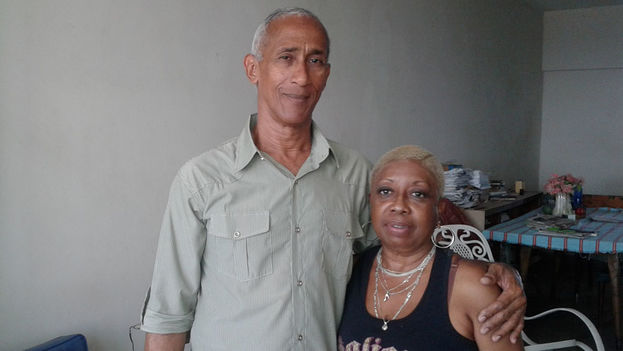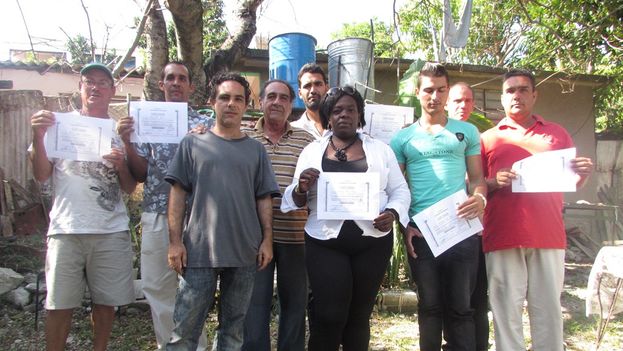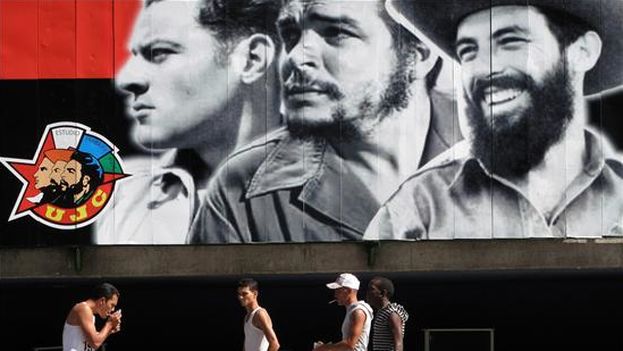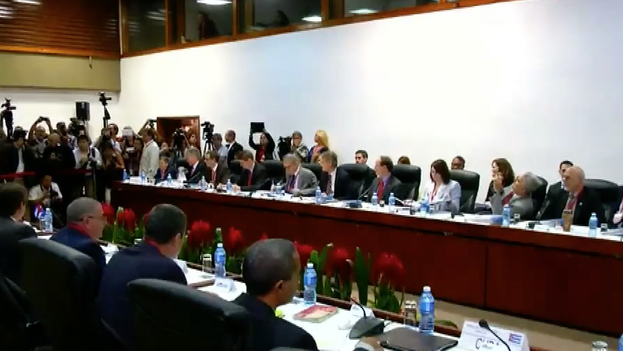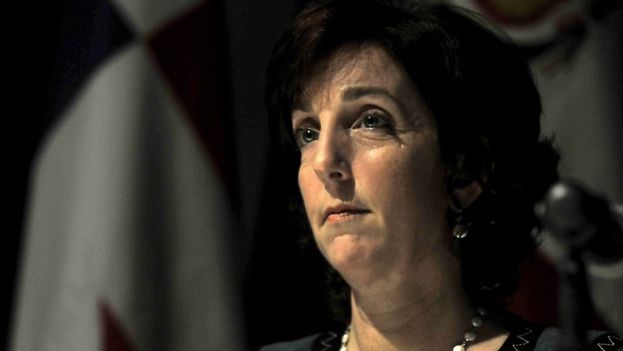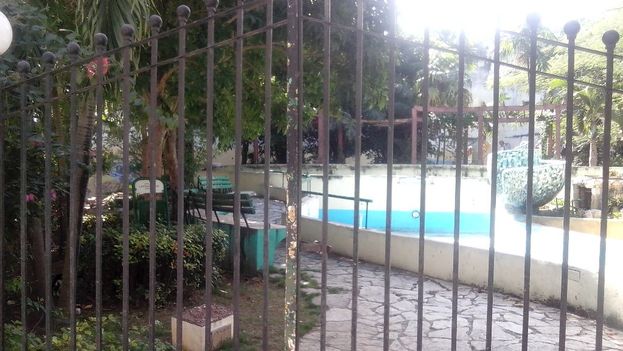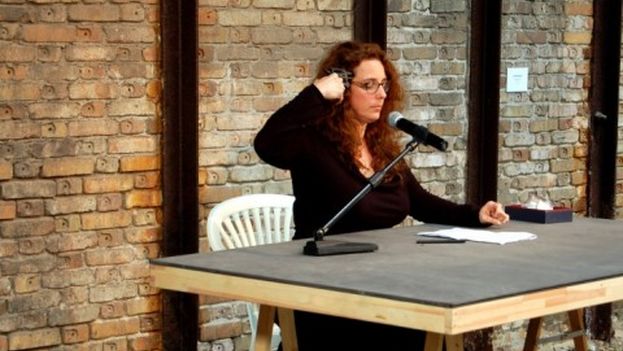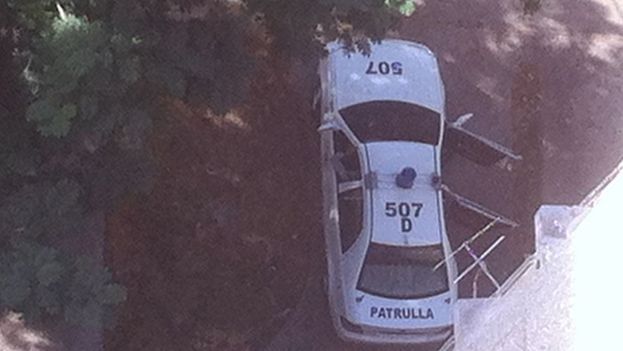Professor Millares directs the program, but the idea – which gave way to a pilot course in 2013 and since then has been repeated three times – came from a young man called Frank Abel García, the coordinator of the academy, who waits for students and guides them continue reading
hrough the steep streets of Mantilla, a neighborhood situated in the south of Havana.
Once seated in the classroom, both relate how they came up with the idea of starting this school. “I worked for Hablemos Press (“We Speak Press” – an independent press group) and interviewed opposition figures like Carlos, for example,” says Frank Abel García, who is also an executive member in the Mesa de Diálogo de la Juventud Cubana (Cuban Youth Roundtable), a project aimed at strengthening youth dialogue and leadership to propel Cuba’s democratization. “When I got here, I took the time to voice my concern about civil society and he made me realize that what I really wanted was to teach a course on leadership.”
“In that moment I only expected to take a group of young people and offer them the possibility of learning about topics like democracy from some of civil society’s personalities,” adds Frank Abel. “We began a pilot course with five students. Then we prepared the first course itself, which welcomed ten participants. From there, eight graduated.” In total, the academy already has around thirty graduates.
For his part, Carlos Millares knew many independent leaders who might be interested in such a project. “Indeed, that’s how it was,” recalls this veteran of the opposition, also director of a center on civil society studies. Political analyst and opinion columnist, Millares recounts that he studied Sociology at the university when, in 1974, he was expelled for “talking about what he wasn’t supposed to talk about.” Those times were too dark for an opinion of even slight skepticism. His courses on leadership are the academy’s main dish.
The necessary “succession of the past generation of the opposition by new young people” came to light when looking for a name that would make the idea concrete. That was how the Fundacion Sucesores was created. “The objective is to prepare young people with the characteristics needed to lead civil society,” Frank Abel García points out, “to prepare people to be able to continue and improve the work of their organizations.”
Would you accept people from the Union of Young Communists (UJC) in the bizarre case that someone might be interested?
“Yes. The academy does not make a distinction based on political inclinations.”
Professor Millares describes the program as “an element of cohesion” for diverse groups whose members take part in its conferences. “An interrelation is created between students, who at the same time exchange with prestigious leaders.” Here we don’t mind where the student hails from, be it from the political party Cuba Independiente y Democrática (CID – Independent and Democratic Cuba) or from the Juventud Activa Cuba Unida (JACU – Active Cuban Youth United), an anti-government civil group.
Would you accept people from the Union of Young Communists (UJC) in the bizarre case that someone might be interested? The Foundation’s coordinator and vice-president responds: “Yes. The academy does not make a distinction based on political inclinations. We admit all those who want to take part in the course because the goal is not to impose a way of thinking, but to offer knowledge on which to base individual opinion and work.”
The proposal has been growing in popularity. The current semester welcomed twenty registration applications for only ten available spots. Carlos Millares favors focused attention, and thus favors fewer students; of course, they must be able to put in effort and prepare very well.
The authors of the program are well aware of the pressure that State Security forces tend to exert. That is the reason why initial enrollment can reach twelve, to account for the eventual “losses” throughout the semester. “Last semester there was a married couple that came to classes, but they worked for the Public Health System and they were threatened with being removed from their jobs if they continued with us,” the leadership professor relates.
They have also received police citations and suffered detentions here and there. Although they “do not bother us behind closed doors,” says Millares, “for government authorities, we are part of that civil society they accuse of being fabricated.”
“Last semester there was a married couple that came to classes, but they worked for the Public Health System and they were threatened with being removed from their jobs if they continued with us”
In spite of the harassment, the academy has continued to consolidate. It already has several sessions and boasts a community of graduates. In addition to Millares and García, the Executive Board also has two vice-presidents: Saúl Quiala for public relations and Maikel Pardo for the press.
Fundación Sucesores maintains relations with international organizations that support the development of its courses. Its future perspectives are to expand into Cuba’s interior, and they have already begun to achieve it with the enrollment of students from Pinar del Río province. Additionally, they are working to prepare a multimedia library. In the long term, the academy aspires to become a sort of “university of the opposition.”
Enrollment is by open call. It is necessary to posses a High School or technical diploma as a minimum, given the level of the content discussed in the conferences. For the course’s final evaluation, a project for civil society must be conceived, and it’s not just a mere academic exercise; some of the ideas developed in past courses have been successful and are currently being applied.
Courses are forty semester hours and are taught in two-hour weekly sessions at the Foundation as well as the headquarters of affiliated regional organizations. In addition to the subject of leadership, there are conferences about economics, political parties, anti-segregation movements, new technologies, and many other areas, all discussed by guest experts, among which are renowned opposition figures ranging from political leaders to LGBT activists.
The program is updated each year. Recently, the topic of Cuba-U.S. relations has been added, and, for this upcoming April, human rights observers will be trained in coordination with the Cuban Human Rights and National Reconciliation Commission led by Elizardo Sánchez.
Back in the patio of that Mantilla home, while Carlos Millares teaches his course on leadership – the current semester’s second meeting – Frank Abel García finishes explaining the functioning of the school.
Speaking with students at the end of the conference, one can perceive the diverse stories that shaped each of the course’s participants. Eliosbel Garriga, from Pinar del Río, is a member of the Movimiento Integración Racial, or “Racial Integration Movement”: “We come in whatever we can,” he comments in reference to the difficult mission that is waking up in the early morning in order to travel from Los Palacios, where he lives, “but I want to develop leadership skills.”
There is also Josué, a young member of the CID party: “I have the intention of becoming a leader and my dad told me that this was a good course.” His father, Esteban Ajetes, is next to him. “Within our movement, knowledge and training are lacking. It’s the first thing needed to be influential in these apolitical times,” he reflects on.
Another Esteban, but surnamed García, is an independent journalist and editor of the JACU’s bulletin. He notes, “In our current circumstances [as a nation] it’s difficult to be a leader because even a sportsperson exhibits more leadership than a political figure.” They all agree on that leaders are not only born or made, but are actually little bit of both things.
Translated by Fernando Fornaris

